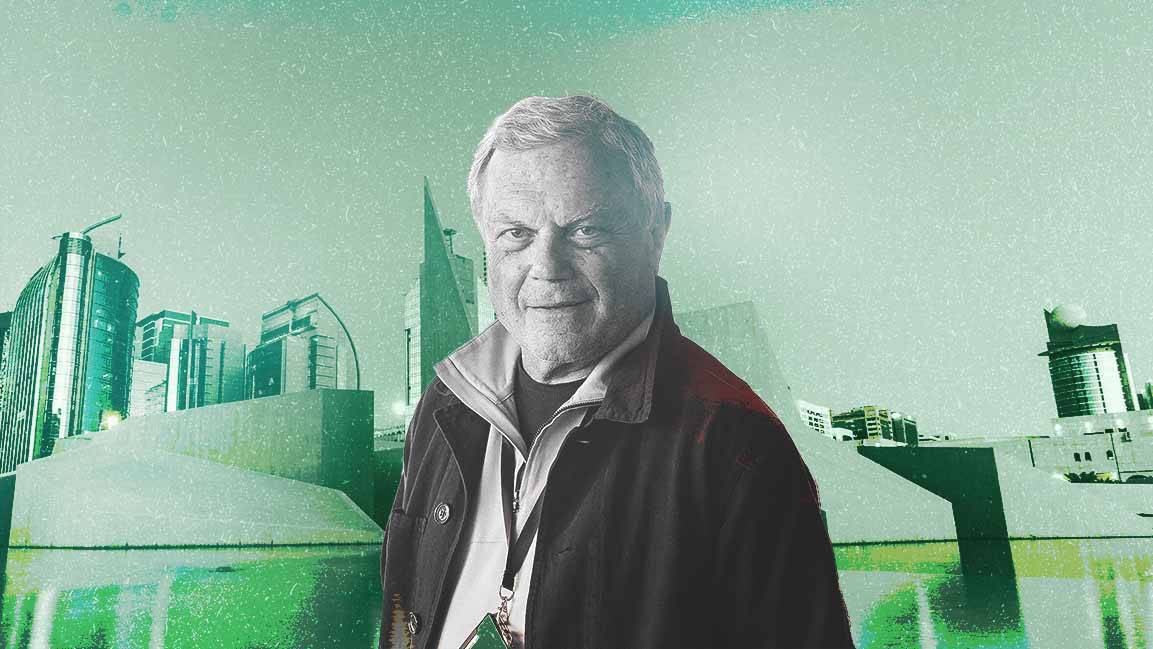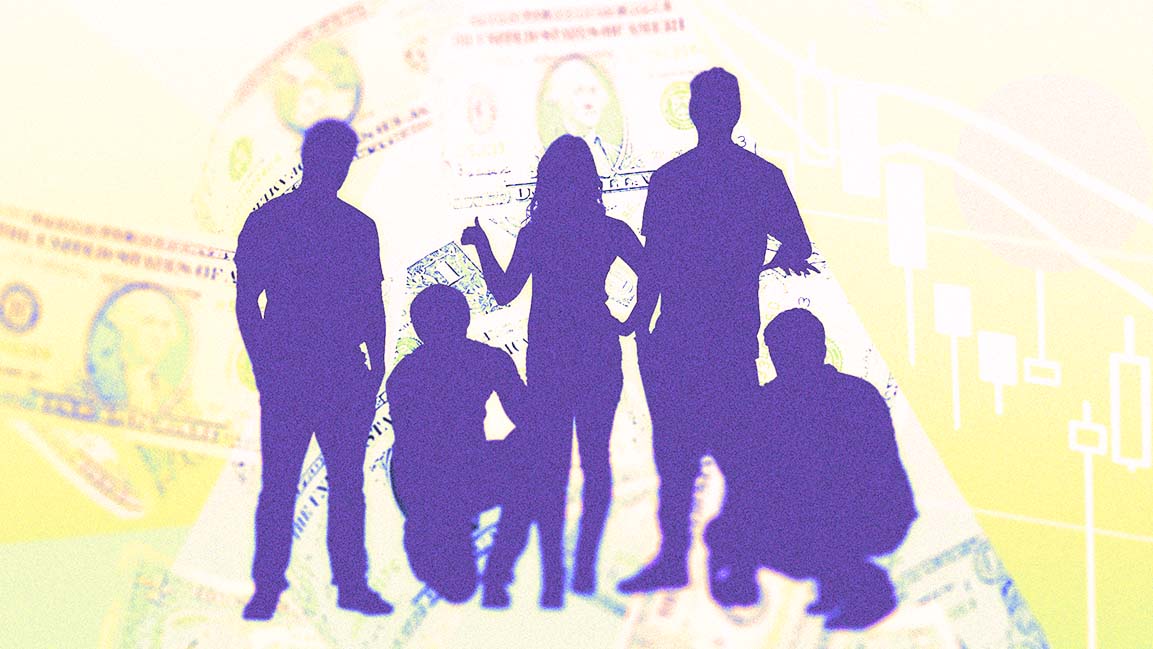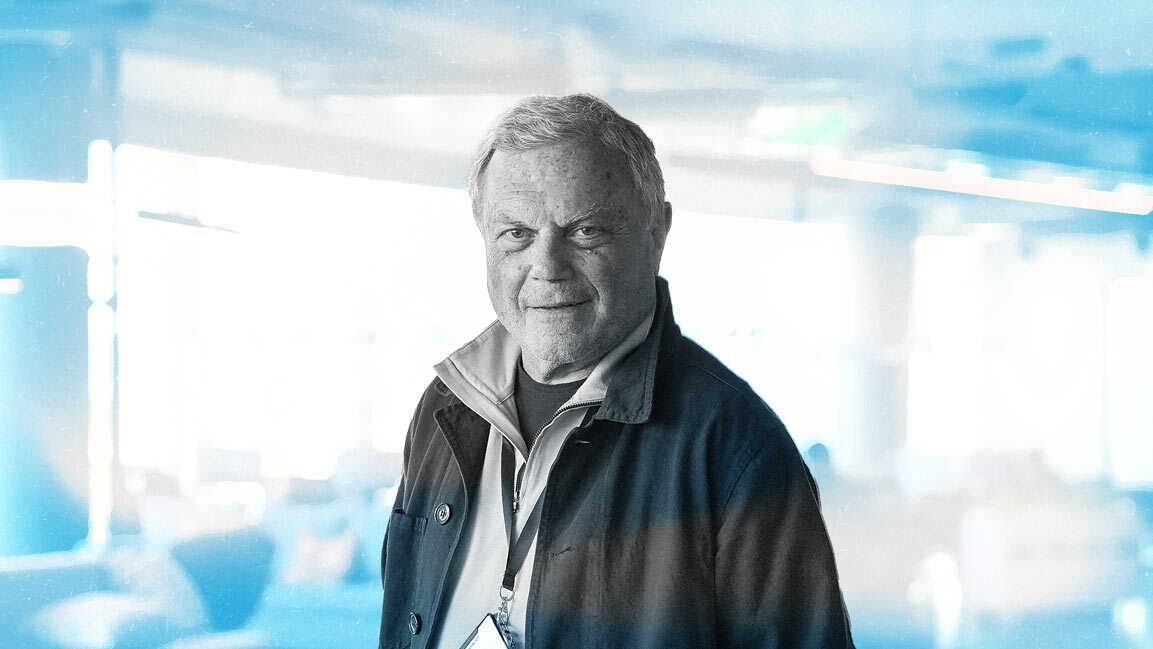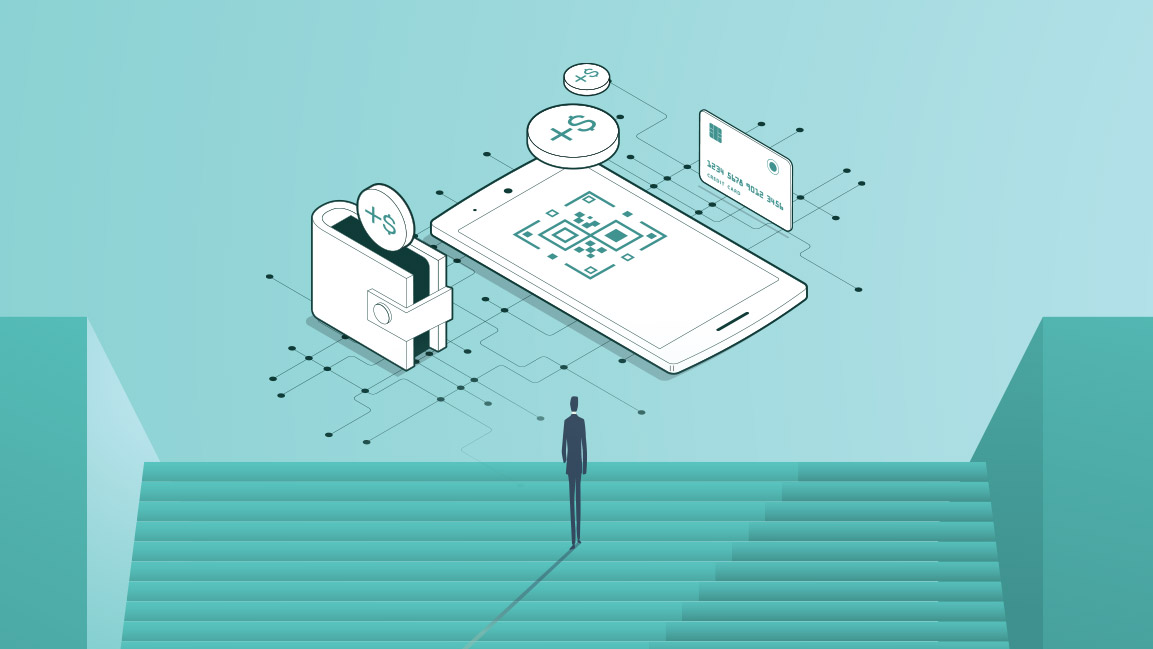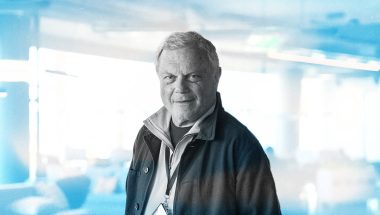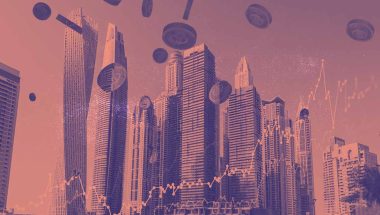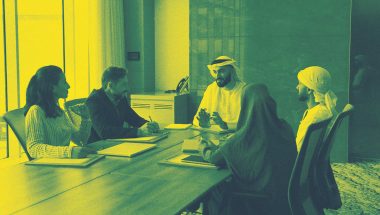- | 10:00 am
What do we want the future to look like? Experts at the World Changing Ideas Summit share ideas
Driving the conversation about steps toward improving the future at the summit, experts say collaboration, collective thinking, and innovation will lay the foundation.
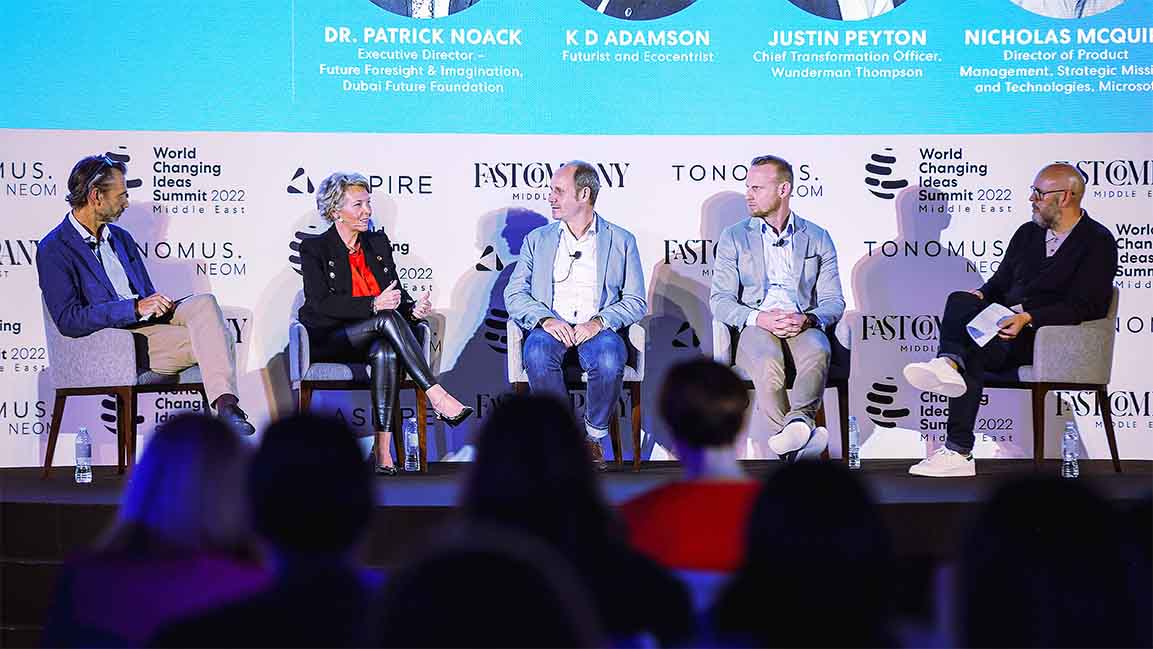
What do you get when you bring together some of the best thinkers, futurists, and progressive-minded experts to discuss the immense challenges and opportunities we face? At the Fast Company Middle East’s World Changing Ideas Summit, they talked about how they see the world we live in – and what is key to creating a better future.
The world is facing an existential crisis: a climate crisis. How can we better prepare for climate change and work toward food security? What does real sustainability mean? Do we need collaborative intelligence? Can a modern economy deliver shared prosperity? Do we need to rethink metrics like GDP?
These are critical questions, and the experts at the summit reinforced the fact that we need better tools, from life-long active learning to better collaborations and innovations, for our future progress.
Here are a few key takeaways from the summit:
DEVELOPING TECHNOLOGIES TO TAKE US TO FUTURE
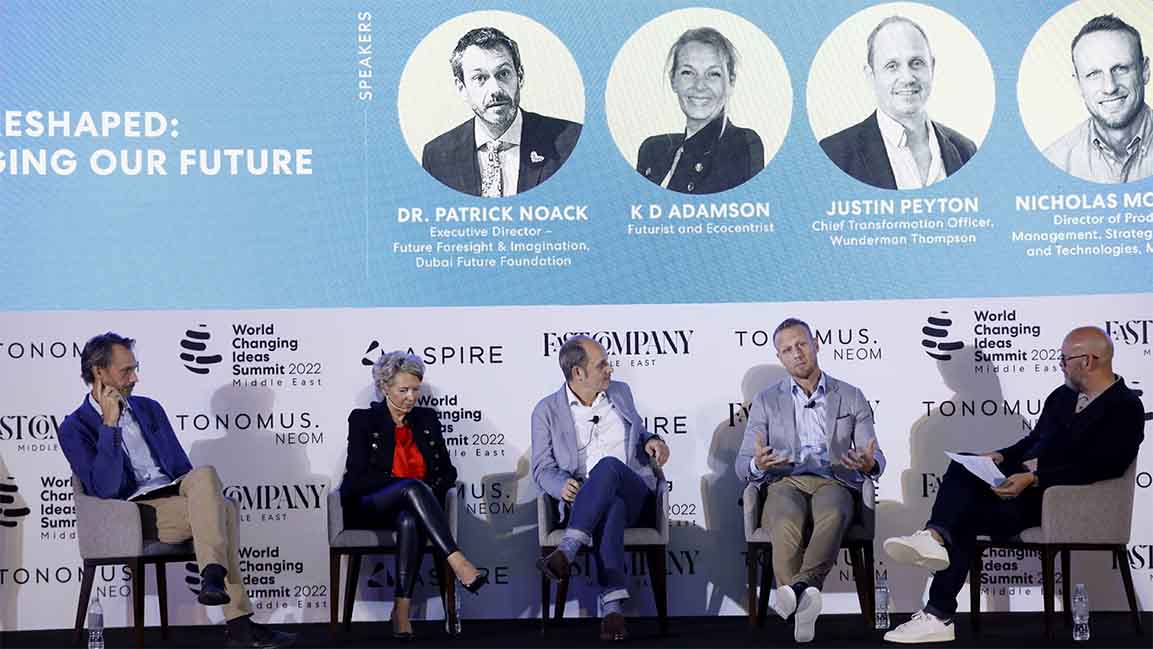
(From left to right) Dr. Patrick Noack, Executive Director – Future Foresight & Imagination, Dubai Future Foundation, K D Adamson, Futurist and Ecocentrist, Justin Peyton, Chief Transformation Officer, Wunderman Thompson, Nicholas Mcquire, Director of Product Management, Strategic Missions and Technologies, Microsoft, Scott Armstrong, Founder, CEO, Editor, Moderator & Podcaster
The convergence of technologies is reshaping our world and bringing futuristic concepts closer to reality. Discussing this, the experts shared ideas about how it can redefine our future, to achieve sustainable, smart, and equitable goals.
“The fundamental question to ask is what kind of future we want. Once that’s clear in our minds, we can develop and make technologies that can align us and take us to that future,” says Dr. Patrick Noack, Executive Director of Future Foresight & Imagination, Dubai Future Foundation. “Taking a step back and assessing where we want to go in the future will help better.”
That said, one person with great ideas cannot solve the world’s problems, says Justin Peyton, Chief Transformation Officer, Wunderman Thompson, adding, “collective thinking has the power to solve problems better.”
Experts agreed that something is fundamentally wrong with how we assess progress. Getting the measure right – or at least a lot better – is crucially important, especially in our metrics- and performance-oriented society. “We need to rethink the metrics of success. GDP doesn’t cut it anymore; it’s too blunt to reflect the society,” Noack adds.
Fortunately, advances in technology have provided us with better measurement tools, and many countries have begun to embrace them.
So can technology solve the problems we face today? “It is the incentive to develop powerful technologies that matter the most,” says K D Adamson, Futurist and Ecocentrist.
WE NEED A NEW FOOD SYSTEM
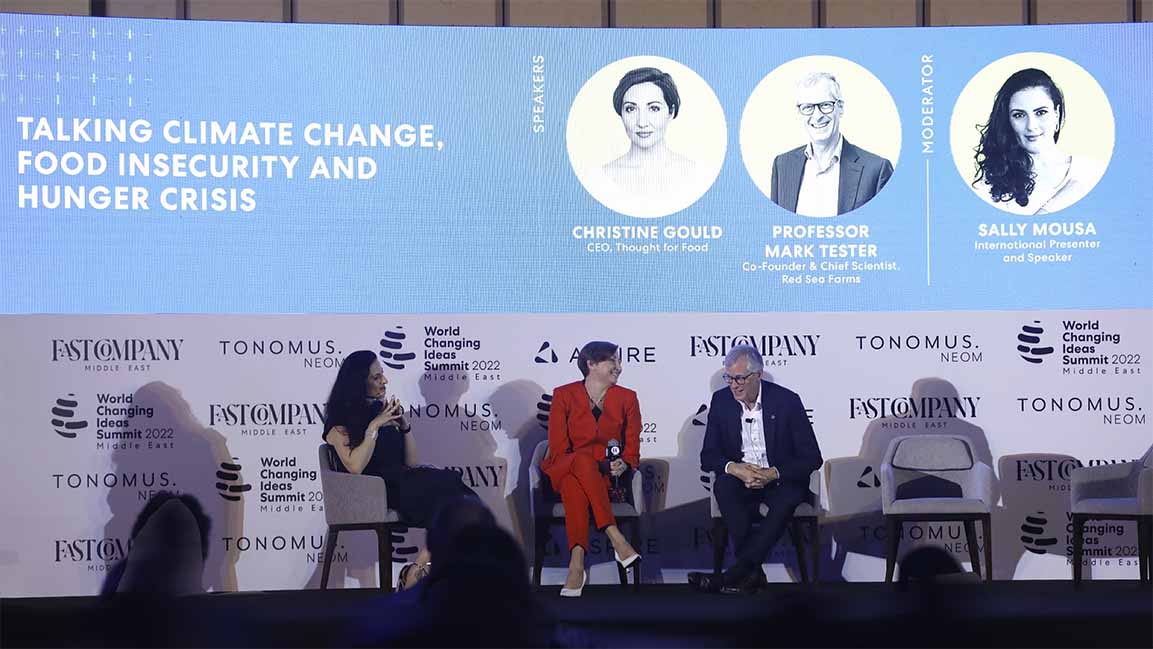
(From left to right) Sally Mousa, International Presenter and Speaker, Christine Gould, CEO, Thought for Food, Prof. Mark Tester, Co-Founder & Chief Scientist, Red Sea Farms
With climate change affecting the food systems worldwide, the need for innovations to produce sufficient food to meet the ever-rising demands is the need of the hour. Empowering more young people to make a difference in the system is critical, too.
“The planet has many challenges, and the food system is the most environmentally impactful. It is among the sectors that emit high levels of greenhouse gasses,” Professor Mark Tester, Co-founder & Chief Scientist, RedSea.
“We have to change the food system,” Tester says, adding the carbon footprint is enormous, coupled with the insufficient nutrition that women and children get.
“We have a big challenge of feeding people, and it is getting harder, especially in areas of environmental degradation,” says Christine Gould, Founder and CEO of Thought for Food, touching upon the green revolution, which has its fair share of positives and negatives.
Highlighting these challenges the agricultural sector is currently facing, Gould says, “Our food system is working very well in the way it was designed; we have focused on efficiency, optimization, and calories. But, now we need a new system.”
COLLABORATION THE WAY FORWARD FOR SUSTAINABILITY
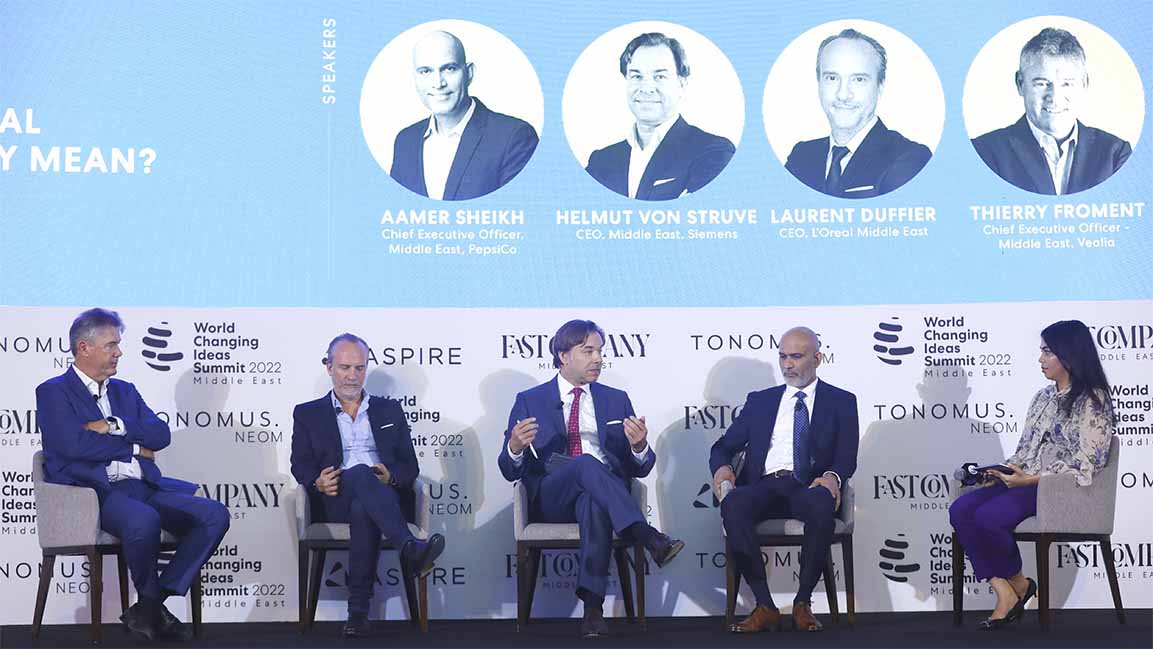
(From left to right) Thierry Froment, CEO -Middle East, Veolia, Laurent Duffier, CEO, L’Oreal Middle East, Helmut Von Struve, CEO, Middle East, Siemens, Aamer Sheikh, CEO, Middle East, PepsiCo, Rachel Dawson, Correspondent, Fast Company Middle East
Sustainability is a more urgent concern than ever. There are dozens of reports outlining serious consequences already taking effect—and what’s coming if we don’t act. So it’s only natural that our approach to sustainability should include transforming the way we behave both as businesses and as consumers.
But what does real sustainability mean? And most importantly, what is the future of sustainability in the Middle East?
For one, Helmut von Struve, CEO of Middle East, Siemens, says, “If a region like the Middle East, which is energy-rich, talks about sustainability, it showcases that people here care about it.”
Similarly, Aamer Sheikh, CEO of Middle East at PepsiCo, adds, “For Middle East businesses and governments, it is important to understand that if you are good at something, you need to disrupt it before anyone else does.”
However, to achieve this shared vision, experts say for businesses, it is important to collaborate. “Bring partners with common goals and shared visions. It is not just about signing an MOU but making visible development,” Sheikh adds.
Adding to the point, Laurent Duffier, CEO of L’Oreal Middle East, says, “COP28 in the UAE will crystallize many things in the air. It will see strong commitments from the governments.”
Additionally, “It is important to have more women at the decision-making tables. They bring the heart along with knowledge,” he adds.
Thierry Froment, Chief Executive Officer – Middle East, Veolia Water Technologies, says the approach to sustainability has to be long-term. “But very efficient at the same time. We need to act today, considering the climate crisis. Water is scarce, so recycle water as much as possible. It should be our priority.”
For the future, experts agreed, we need more diverse perspectives, knowledge, skills, and methods for approaching problems that can be combined to advance human creativity and innovation.
WHAT WILL BE THE TOP FUTURE SKILLS?
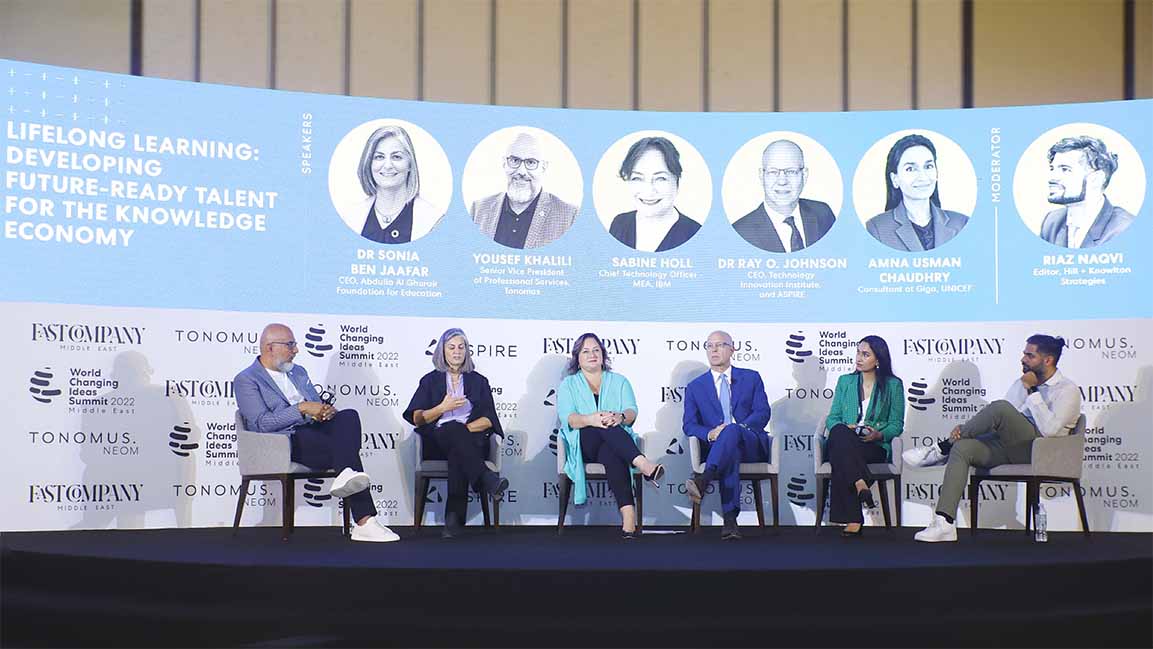
(From left to right) Yousef Khalili, Senior Vice President of Professional Services, Tonomus, Dr Sonia Jaafar, CEO, Abdulla Al Ghurair Foundation for Education, Sabine Holl, Chief Technology Officer, MEA, IBM, Dr Ray O. Johnson, CEO, Technology Innovation Institute & ASPIRE, Amna Usman Chaudhry, Consultant at Giga, UNICEF, Riaz Naqvi, Editor, Hill+Knowlton Strategies
In the next five years, over two-thirds of the abilities that are relevant now will be obsolete. Considering how crucial human capital is to businesses, it may be in companies’ best interests to prepare their workers for the future.
Businesses nowadays must support their workforce’s ability to adapt and succeed throughout their careers. Experts discussed the top job skills for the future workforce and the value of collaborative intelligence.
Talking about how organizations can keep pace with emerging tech, Yousef Khalili, Senior Vice President of Professional Services at Tonomus, says, “Disruption is the new way of doing business. We are in a situation where some new technology will come when we finish our homework.”
For instance, the metaverse is an emerging technology. “The question is, what jobs will we need in metaverse besides chief metaverse officers and program managers?”
Experts agreed that tech companies should remember human capital. Dr Sonia Ben Jaafar, CEO of Abdulla Al Ghurair Foundation for Education, says, “If you are only investing in technology and not in your people, you are being a ‘loss leader.’ It is more than upskilling them; it is about supporting them.”
Concurring with Ben Jaafar, Sabine Holl, Chief Technology Officer – MEA, IBM, says, “Technology can’t replace humans. It can aid and upskill them. For instance, gamification enables better learning.”
Experts say businesses must build long-term partnerships with students for future human capital. And to do that, Dr Ray O. Johnson, CEO of Technology Innovation Institute and ASPIRE, says, “It is important we restructure the education system and involve gamification during learning processes.”
“Overspecialization is a risk as the skills that are a fad today will change tomorrow,” he adds.
While discussing the importance of life-long learning, experts pointed out that organizations must include diversity, equity, and inclusion to attract and retain talent. “There is a direct correlation between inequality and connectivity. When it comes to the gender divide, four out of five women don’t have connectivity in the least developed countries. Companies need to come and support at both micro and macro level,” says Amna Usman Chaudhry, consultant at Giga, UNICEF.
Adding to Chaudhry’s point, Johnson says, “Diversity of thoughts, backgrounds, cultures, and experiences is needed to look at solutions from different perspectives and bring innovation.”
During the panel discussion, experts considered flexibility, integrity, self-awareness, curiosity, active learning, empathy, and digital skills as the top skills of the future.
CAN DOCTORS BE REPLACED BY TECH?
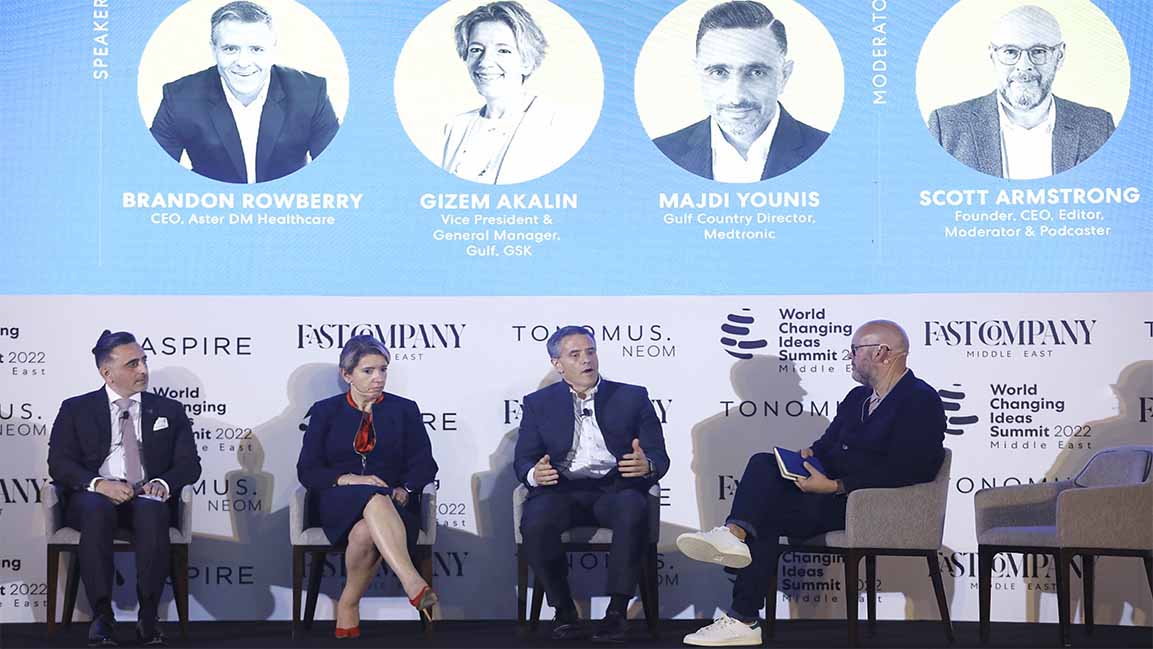
(From left to right) Majdi Younis, Gulf Country Director, Medtronic, Gizem Akalin, Vice President & General Manager, Gulf, GSK, Brandon Rowberry, CEO, Aster DM Healthcare, Scott Armstrong, Founder, CEO, Editor, Moderator & Speaker
Pandemic catalyzed the rapid adoption of telehealth across the Middle East, and it will continue. Experts agreed that the future of healthcare, despite technological advancements, would still be governed by humans.
“Human doctors will still be very much relevant to the future of healthcare,” said Brandon Rowberry, CEO of Aster DM Healthcare. “Technology will affect how those humans function, making them highly efficient,” he added.
“What we’ve noticed has changed since the pandemic is how we use technology. With new advancements, many of these monitoring devices can be controlled remotely, which disrupted the industry of providing healthcare as we know it,” said Majdi Younis, Gulf Country Director, Medtronic. “Technology won’t replace a doctor but will facilitate patients’ lives and make it easier for them to access. Overall, technology is an enabler rather than a replacement of any healthcare practitioner,” he added.
What will steer the future of healthcare will be a “collaboration mindset and breakthrough innovations,” said Gizem Akalin, Vice President & General Manager of Gulf, GSK.












